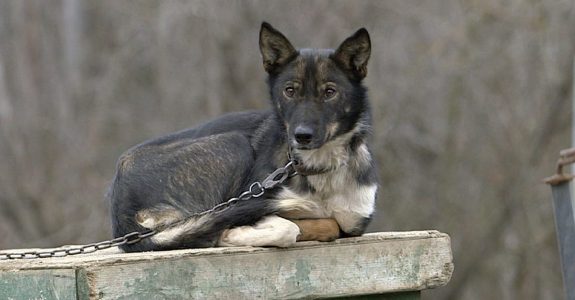Canada’s largest province has updated its standards of care for dogs kept outdoors, taking many steps in the right direction but still falling short of protecting dogs in cruel commercial sled dog operations and those kept tied up outdoors during all weather. Ontario Regulation 351/22, which will update Ontario’s existing standards of care Regulation, will come into force on Canada Day and offer improved standards for shelter, food, water, and types of tethers used on dogs kept outdoors.
Animal Justice responded to Ontario’s public consultation on the proposed updates with a detailed submission. We were concerned that the updates ignored practices that are well-known to inflict immense physical and emotional suffering on dogs, such as continuous outdoor tethering and commercial sled dog operations. Over 4,000 Animal Justice supporters joined us in asking the Solicitor General to end the commercial dog sledding industry outright, or at the very least, enact strong regulations to put an end to the cruelty which is rampant in the dog sledding industry.
The new regulation represents significant progress for dogs kept outdoors, with many new standards in line with Animal Justice’s recommendations. Updates include:
• Size and space requirements of “housing pens” for dogs kept outdoors are now clearly set out relative to the size of the dogs using these pens. These requirements must be altered for multiple dogs being kept in a single pen area and dogs must also not be kept in a pen with “incompatible dogs” that may exhibit aggression to other dogs.
• It is now explicitly required that outdoor dogs be provided clean, unfrozen, unspoiled, and otherwise appropriate amounts of food or water matching their nutritional needs. Food must not be spoiled; must not contain dirt, feces, urine, or toxic substances; must reflect the dog’s daily caloric and other nutritional requirements; and must be “fit for consumption”. Water must be replaced at least once every 24 hours; must not be frozen; and must not contain dirt, feces, urine, or toxic substances.
• The size and nature of dog houses for outdoor dogs has been upgraded. Before, shelter just needed to be “weather-proofed”, “insulated” and the size needed to be “adequate and appropriate” for the dog. Now, in addition to these requirements, shelters must be structurally sound, have a level floor that is elevated from the ground and dry, provide ventilation, be large enough for a dog to turn around, lie down with their legs fully extended, and stand with their heads held at normal height, and contain bedding that is changed as frequently as necessary to ensure that it remains comfortable, clean, and unsoiled.
• The types of tethers used on outdoor dogs are now regulated, although the limit on time-on-tether is still very problematic. Also, choke collars, pinch collars, prong collars, slip collars, and other problematic variations of collars must not be used on outdoor dogs. Dogs must also not be tethered if under 6 months of age; whelping; nursing; or in heat. And they must not be tethered in a manner that creates an undue risk of distress related to the age, health, and reproductive status or distress based on objects or hazards that the dog is able to reach while tethered.
Ontario needs to do more for dogs kept outdoors. The updated regulation does not ban or even regulate dog sledding operations and the regulation does not fully ban tethering or adequately limit this practice. The updated regulation also doesn’t establish clear enforceable standards to protect dogs from being left outdoors in extreme weather conditions.
You Can Help
Animal Justice will continue to fight for the legal protections that these dogs desperately need and deserve. Ontario does not yet regulate the dog sledding industry, and keeping dogs chained outdoors for extended periods of time remains legal in the province. Please tell Ontario Premier Doug Ford and Solicitor General Sylvia Jones that these dogs deserve better than a life of misery on the end of a chain!
Banner image by Sled Dogs Film.




